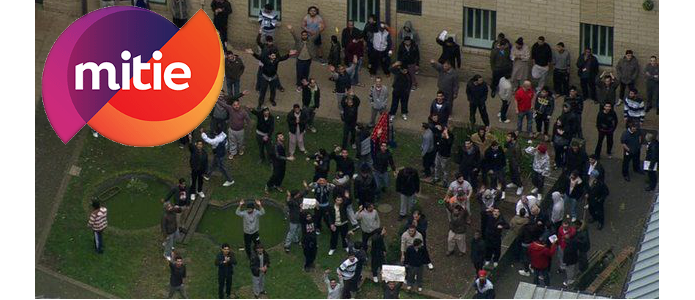Mitie profits over £2m from detention

[responsivevoice_button]
Mitie profits over £2m from detention centres despite criticisms
Mitie Care and Custody, the company that runs the majority of Britain’s immigration detention centres, has recorded a six fold increase in its annual profits. The firm cashed in over £2 million for the last financial year, up from £333,000.
The company’s director attributed the profit rise to taking over the Harmondsworth and Colnbrook detention centres outside Heathrow airport in September 2014. The Home Office is paying Mitie £180m over an eight year contract to run these centres.
This contract has proved highly profitable for the company, but comes amid deteriorating care and decreasing staff morale at those centres, which used to be run by rival outsourcing giants Serco and the Geo Group.
Mitie’s newly released profit figures run until the end of March 2015. In that month, both centres faced open revolt among detainees who were angry at worsening conditions and staged a wave of hunger strikes. Staff also complained about their new corporate bosses. One disgruntled guard claimed that the new management was making staff work more shifts, and said Mitie has “fucked this place up, they fucked it up”.
Secret filming showed the new centre manager, Paul Morrison, telling detainees they would be locked in their cells for two hours longer each day under Mitie’s “more efficient” contract. When challenged by detainees about his motives, Morrison insisted this change was not designed to make more profit. Financial records reveal that Morrison and other centre mangers now hold shares in Mitie Care and Custody.
The Independent Monitoring Board (IMB), which visits the centres on a regular basis, also raised concerns after seeing the first four months of Mitie’s tenure. In their 2014 annual report, they said that Harmondsworth was “in large parts a depressing, dirty place and in some cases has a destructive effect on the welfare of detainees.” They highlighted “the poor maintenance of the Centre, detaining vulnerable detainees in unsuitable conditions, the continued detention of those ‘unfit to be detained’ and the complaints process.”
Although things were far from perfect under the old contractor, the Geo Group, inspectors said that “Some procedures and systems that worked under Geo (albeit to a substandard level) are currently suffering under Mitie as a result of staffing and organisational changes.” And the criticisms didn’t stop there:
“Maintenance issues, inherited by Geo, despite being addressed by Mitie, remain outstanding at the time of writing. Staffing levels do not seem adequate to meet the needs of detainees. Staff morale is low. This adversely affects the welfare of detainees. The IMB continued to receive complaints about staff behaviour.”
They concluded that “an increasing number of problems have related to the contractor where the changing of contracts has left gaps in service provision for the detainees.”And over at Colnbrook, the inspectors weren’t that impressed either. They said that, “The change in contractor [from Serco to Mitie] has resulted in significant staffing issues … staff are overstretched and have less time available to interface with detainees, resulting in an increasing level of dissatisfaction amongst the detainees.” Keith Vaz MP has claimed that Mitie took on the Colnbrook contract for 30% less than their predecessor Serco, so these staffing issues are hardly surprising.
The IMB’s annual report on Colnbrook also said that facilities for physically disabled detainees were “inadequate”, and “access for detainees to see a doctor during 2014 has deteriorated and this is a significant cause for concern.” Tellingly, 43% of complaints to the IMB in 2014 were made in the last four months of the year, after the contract changed hands.
Inspectors also “observed a general deterioration in the cleanliness of the centre, activities not being operated as frequently as before the change in contract, and staff morale being low. It is not apparent whether these issues are teething problems associated with the significant changes inherent in a change of contractor or whether the staffing profile envisaged in the new contract is inadequate.”
But the inspectors couldn’t check this out, because they “have not been given sight of the new contract on the grounds that it is commercially sensitive.”
And if detainees made complaints, they were unlikely to be investigated independently. “There have been serious failings in the complaints system in 2014”, inspectors said. They often found that complaints are investigated by the managers:
“for the area where the complaint emanated without any independent scrutiny. The investigation usually takes the form of obtaining statements from staff involved in the incident that resulted in the complaint, and seldom involves speaking to the complainant to fully understand their perspective on the issue.”
Perhaps inevitably then, “The vast majority of complaints are not substantiated.”
But Mitie ‘Care and Custody’ is undeterred. Its director, Colin Dobell, wraps up the company’s accounts by saying the firm “continues to be active in bidding and developing opportunities in the central government justice outsourcing sector and expects to be successful in securing new business in the year.” Although Dobell sees difficulties ahead “as the new government implements its next round of budgetary cuts”, he expects the firm to “respond positively to the challenges and opportunities this creates.”
